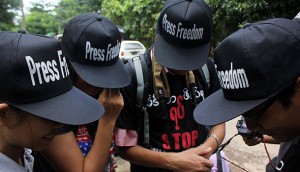Advances and Challenges to Media Freedom in Burma
By Burma Partnership • May 6, 2013 World Press Freedom Day was held on 3 May, marking an eventful year for media freedom and freedom of expression in Burma. There have been both advances towards increased freedoms, but also serious challenges.
World Press Freedom Day was held on 3 May, marking an eventful year for media freedom and freedom of expression in Burma. There have been both advances towards increased freedoms, but also serious challenges.
Most notably, the government ended pre-publication censorship and the disbanded the censorship board, the Press Scrutiny and Registration Division (PSRD). Independent organizations such as the Myanmar Journalist Association, Myanmar Journalist Network and Myanmar Journalist Union, have been permitted to form in order to promote the rights and welfare of journalists, replacing the government affiliated Myanmar Writers and Journalists Association. The Ministry of Information and Communications granted permission for 16 privately owned journals to publish dailies for the first time in 50 years starting on 1 April, with an additional 10 journals granted permission at the end of April. Many exiled journalists have returned to Burma and foreign news agencies, such as Associated Press, NHK and Kyodo News, are opening offices in Rangoon.
Despite these positive steps, there remain many challenges to the freedom of expression of journalists and publications. One of the largest threats of repression is that the Printers and Publishers Registration Act (1962) and other restrictive laws remain on the books, providing legal grounds for the government to repress critical voices.
In August 2012, the Ministry of Information formed the Myanmar Core Press Council staffed with government officials to monitor journalists until a new media law could be enacted. Due to criticism that the council was a continuation of media censorship by the government, the Ministry of Information, under the new leadership of Aung Kyi, replaced the council with the Myanmar Press Council (MPC), two-thirds of whose members are journalists themselves.
The MPC has drafted a code of ethics for journalists as well as a new Press Law Bill, which would repeal the Printers and Publishers Registration Act. However, this draft law does not meet international standards of freedom of expression. As Article 19 explained in its analysis of the law, it does not clearly define who would be protected under the rights described, restricts certain topics from being reported and limits access to information from the government. Furthermore, the bill ensures that the press council remains under the control of the president, and requires that press outlets obtain permission or licenses from the government in order to operate, adding to the existing climate of self-censorship. The UN Special Rapporteur on the situation of human rights in Burma in his report to the Human Rights Council in March emphasized that “the criteria for granting such licences should be reasonable and objective, clear, transparent and non-discriminatory.”
In a confusing move, the Ministry of Information has submitted its own media law to the Parliament, the draft Printing and Publishing Enterprise Law Bill, which was drafted without any consultation with stakeholders. This bill is even more problematic as it does not recognize the right to freedom of expression and would give the government direct control over the media. It also requires all publishers to have permission to publish, contains vague descriptions of restricted topics and outlines excessive fines and imprisonment for those who express themselves freely.
Both bills fall short of international law standards and give the government undemocratic power over the media. Both should be rejected by the Parliament. Draft legislation must be publicized and disseminated widely, and amended to reflect input received from the public and from broad-based and inclusive consultations with all stakeholders, including journalists themselves and civil society.
The issue of freedom of expression has also been raised relating to the coverage of sensitive topics such as anti-Muslim violence or the situation in ethnic nationality areas. While media must have the freedom to report on any topic, they must also take responsibility to factually report the news, rather than contributing to rumors or misinformation. The increase of ethnic journals focusing on news in their respective states and divisions gives voice to issues not covered by most mainstream media and can promote understanding in other parts of the country. As Southeast Asian Press Alliance reported in its summary of press freedom in Burma, journals with sections in ethnic languages are “vital for preserving their ethnic cultures and languages.” These ethnic publications need more support as they contribute to peace and national reconciliation in the country.
Despite steps in the right direction, the government seems hesitant to truly release its control on the press and is finding subtler ways of restricting freedom of opinion and expression. If the government is genuine in its commitment to democratic transition, it must ensure that new media laws protect the freedom of expression of journalists and publications, and meet international human rights standards.
Tags: Burma Partnership, Censorship, Freedom of Expression, Media FreedomThis post is in: Blog
Related PostsBurma Partnership Celebrates Continuing Regional Solidarity for Burma and Embraces the Work Ahead for Progressive Voice
Burma Army Displays Blatant Disregard for 21st Century Panglong Peace Process
Ann Din Coal Power Plant: Local Movement and Action to Preserve and Protect Natural Resources and Land: Mon IDP Report Case Study #4
Latest Human Rights Abuse Case Demonstrates Urgent Need to Reform the Myanmar National Human Rights Commission
Human Rights Far From Guaranteed as US Sanctions on Burma Are Removed









 All posts
All posts